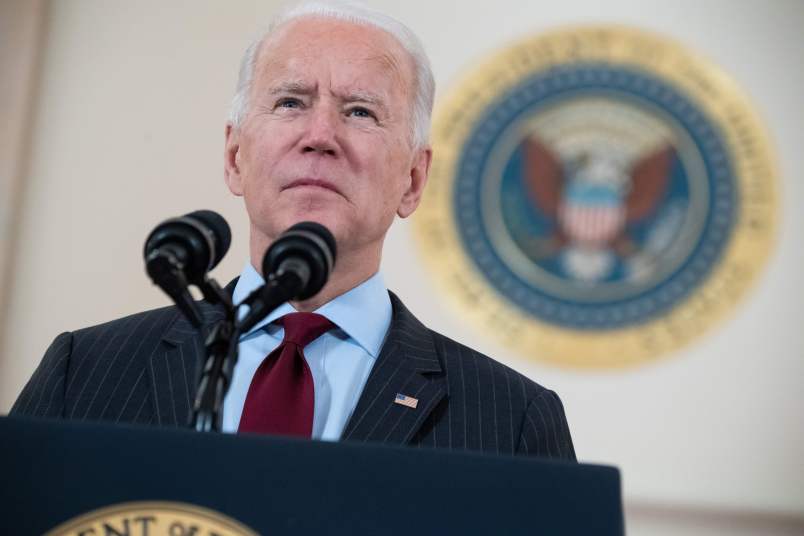President Biden on Sunday night raised brows when he tweeted a video appearing to offer his full-throated support of the unionization effort by Amazon warehouse staffers in Alabama — going further than all recent past presidents, on both sides of the aisle.
Currently, more than 5,800 workers at an Amazon facility in Bessemer, Alabama are amid a seven-week voting period to decide whether they would like to be represented by the Retail, Wholesale and Department Store Union. The e-commerce giant has actively worked to discourage its employees from supporting the union by calling them into mandatory meetings to disparage the drive, urging employees to vote “no” via text messages and placing fliers inside restroom stalls warning of union dues.
The President didn’t explicitly name Amazon in the video, but he made clear he was paying attention — a move to perhaps make good on his campaign promise to be “the most pro-union president you’ve ever seen.”
The move was a distinct and clear break from his recent predecessors.
“After Reagan and the PATCO strike and this cultural signaling that union solidarity was unacceptable, that opened up an open season by employers,” Karen Sawislak, a labor historian and visiting professor at UC Berkeley, told TPM, referring to President Ronald Reagan’s successful 1981 effort to break a strike by the Professional Air Traffic Controllers Union. Nearly 13,000 controllers had walked out after contract talks with the Federal Aviation Administration collapsed.
“Cultural norms of what’s acceptable in terms of employer-union relations are really important,” Sawislak told TPM. “And to the extent that the President is a leader on these issues it is important, to signal that these institutions are valuable.”
Workers in Alabama – and all across America – are voting on whether to organize a union in their workplace. It’s a vitally important choice – one that should be made without intimidation or threats by employers.
Every worker should have a free and fair choice to join a union. pic.twitter.com/2lzbyyii1g
— President Biden (@POTUS) March 1, 2021
Biden’s move is a particularly “interesting moment” for a “fundamentally transactional politician,” said Erik Loomis, a labor historian at the University of Rhode Island. He noted that the Democratic Party has gradually moved into a fuller embrace of issues such as a $15 minimum wage and the labor movement in recent years.
“It shows just how far activists have pushed the Democratic Party over the last 10 years,” Loomis said. “He’s comfortable making that kind of a statement, knowing it’s going to be supported by the party.”
Even as union membership climbed through the middle of the last century, Loomis pointed out, organized labor faced powerful political headwinds: He pointed to the passage of the Taft-Hartley Act in 1947 that restricted the power and activities of labor unions at the “very peak of union power.” The Taft-Hartley Act was pushed through by Congress over the veto of then-President Harry Truman.
Even then, Loomis said, organized labor didn’t have enough congressional support to prevent Taft-Hartley from becoming law. “And the reason for this is that because even at its peak — and it’s mostly the same today — unions are mostly concentrated in about 10 states, and so they don’t have the senators. They don’t have the congressmen, even in the Democratic Party, who rely on that.”
It’s early days, but Biden has brought something of a change of tone.
Within 24 hours of entering office in January, he fired Peter Robb, a Trump appointee at the National Labor Relations Board.
Robb was opposed by organized labor, to whom he had been a longtime antagonist. (He was a former lead attorney for the Reagan administration during its effort to break the PATCO strike.) Groups including the Service Employees International Union and Communications Workers of America had urged Biden to get rid of him immediately.
He did.
“That was a really positive move,” Sawislak told TPM. “The people who are in charge of running [the NLRB], as with many administrative agencies, now reflect priorities of the administration that gets to appoint those people.”







This is an almost existential moment both for unions as a viable counter to the decades long corporate assault on wages and hopefully what could be a better alignment of workers back into the Democratic fold. It’s been a terrible number of election cycles in which there has been a steady migration of Union members voting republican.
And as for as I can see, most of them are a lost cause.
And Amazon is the best company to go after.
I’m still pissed after seeing on The NY Times front page, an advertisement from Amazon pushing for the 15 dollar minimum wage. The fucking duplicitous propaganda from them speaks how much a malign force they are.
This is a powerful statement, well spoken. We need to have strong unions and an empowered working class to create the world we need going forward. If the workers can get organized and produce results maybe racist attitudes will be seen as counter productive to everyman’s interests.
Good. It’s about damned time.
Who is this Joe Biden of whom you write, TPM?